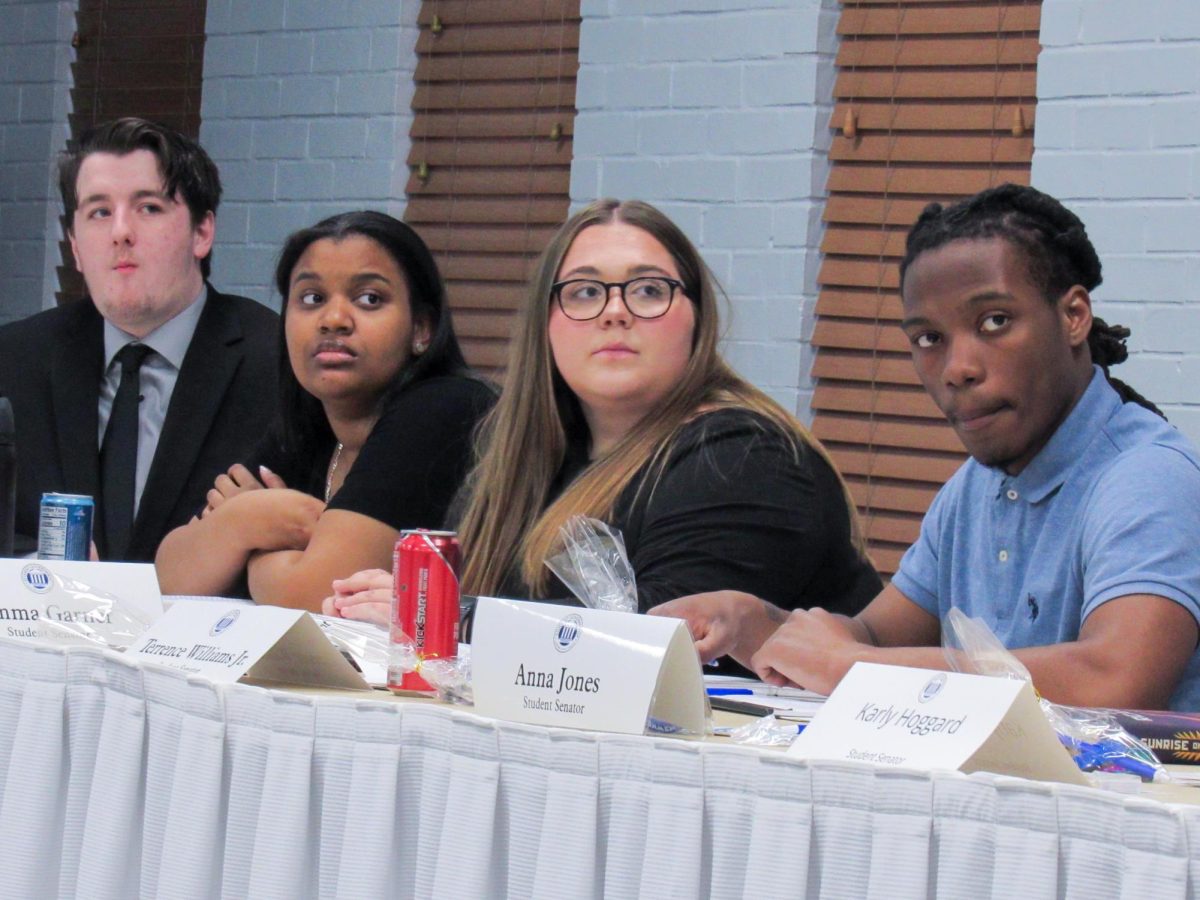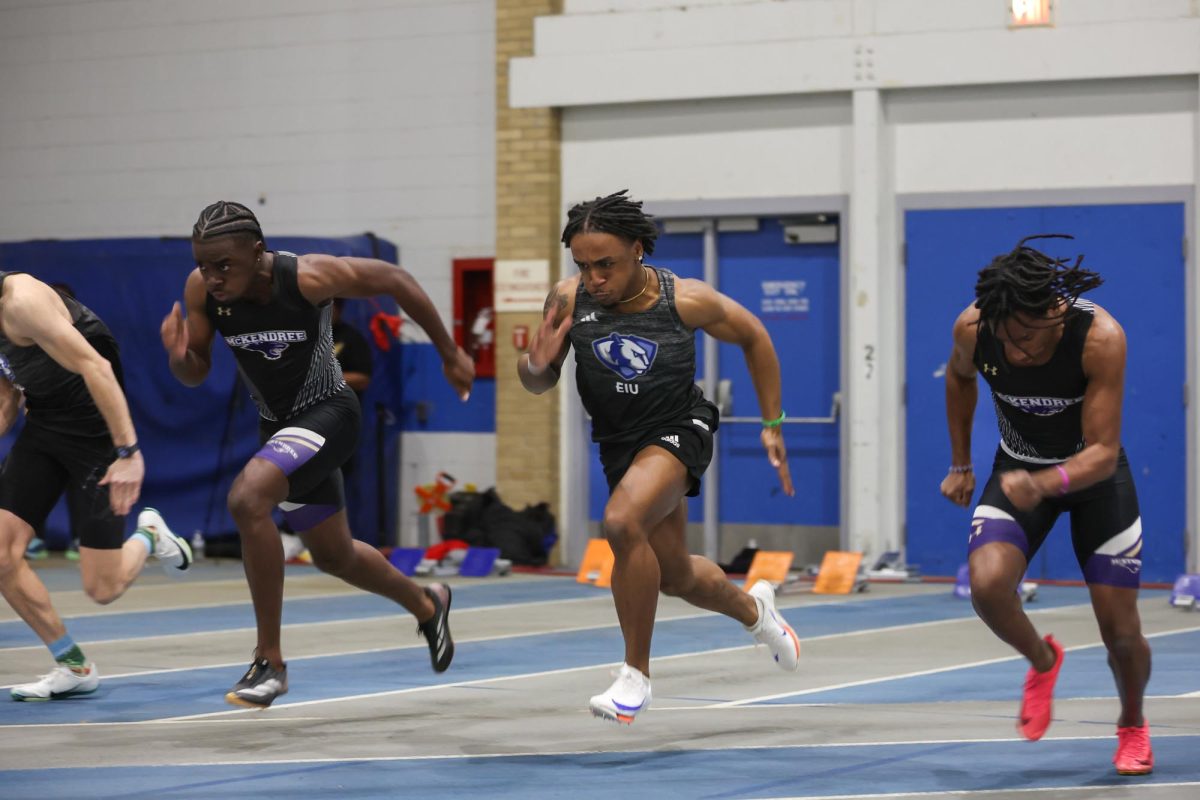CAA tables gateway admission revisions
March 31, 2017
The Council on Academic Affairs approved 3 items on its agenda Thursday and tabled a proposal for revisions to Internal Governing Policy no. 68 to allow for further discussion concerning proposed changes to the description of the Gateway program in the university catalog.
Stacey Ruholl, CAA chair, opened discussion of IGP no. 68 by stating that several parties had voiced their concerns with the proposed revisions ahead of Thursday’s meeting.
Kelly Miller, the director of admissions, explained how the proposals originated.
Miller said the admissions office continues to hear from students and advisors that Eastern’s three-tiered admissions requirements are too difficult. They decided to form a committee to look specifically at Eastern’s admissions criteria so that it aligned with other institutions.
“When we thought we were ready to come to CAA and update the catalog, we discovered that our admissions policies were six pages of the catalog and it included all of this other stuff,” Miller said. “International programs, immunization records, Gateway… many of which had not been updated for I don’t know how many years.”
Miller said she then approached Mona Davenport, the director of minority affairs, and suggested that the description of the Gateway program seemed out of line.
“There are all these other things that are under our admission policies that I had no idea would be under admission policies. But we thought, while we’re here let’s clean everything up and clarify it so it is current with what we’re actually doing,” Miller said.
Davenport said the Gateway program began as the Minority Assistance Program in 1990. Davenport served as an adviser when the MAP program was founded and when the information for the catalog was written.
Davenport said after prompted to review the Gateway program’s description by Miller, she deleted a passage in the first paragraph of the program’s description that read, “…Maintaining a culturally diverse student body, including adequate representation of students in the total student body, is an educational goal of the university. The university measures annual progress towards its ultimate goal by increases in the percentage of underrepresented students in its student body. Underrepresented students include those who will be the first in their family to obtain a college degree.”
Davenport said she was insulted at the implication that Gateway was the only way Eastern could maintain a culturally diverse student body and did not want it to be the measure of Eastern’s diversity.
“On a daily basis, I get calls from faculty and staff. Everybody who has a student of color wants to call and tell me that they’re a Gateway student and they’re having problems with them and (ask) what can they do?” she said. “And not always are those problems of Gateway students.”
Concerning a passage that read, “Students admitted to the program are provided the following: designated program academic advisors; assessment of basic skills in reading, writing, and mathematics; placement in specified courses; and programs selected to address special needs or deficiencies identified by assessment,” Davenport said when the program started in 1990, the students met exclusively with academic advisors.
Davenport said now the program has four academic advisers and three graduate assistants and the program currently makes use of a Nelson-Denny evaluation during orientation, but it does not offer assessments in writing and mathematics.
“I’m a firm believer that the program is good,” Davenport said. “It will always be good. It will always be here. I have admitted quite a few students for the fall of 2017. Our yield has somewhat decreased, but so has enrollment.”
Following Davenport’s initial remarks, Gene Deerman, associate professor of sociology, voiced her concerns about the proposed revisions.
She said she was surprised to learn that Eastern does not have the supports specified in an internal governing policy for students admitted under the Gateway program. She said she could not support the program without it.
“The Eastern that I believe in, the Eastern that I am passionately committed to…is an Eastern that takes the students we admit and stands by them because we have admitted them,” Deerman said. “We believe in them and we provide them support that will result in a retention rate of over 80 percent.” She said the retention rate is something she is especially proud of.
Josh Norman, associate vice president for enrollment management, served on the committee that reviewed Eastern’s admission requirements. Norman said he thinks there has been some confusion surrounding the proposals.
“This doesn’t have anything to do with what we set out to do as a committee,” Norman said. “There was never a discussion within the committee regarding that particular issue.”
Later, Norman said that he thought it was obvious that more discussion about the changes made to the Gateway section was needed.
Deerman asked Provost Blair Lord whether he “had an aim on the table here to achieve efficiencies in advising.”
“The discussion about the advising relocation was not initiated by me,” Lord said.
Deerman pressed further and Lord said that the task given to him by President David Glassman with an inadequate budget is to seek the most efficient use of resources he possibly can and that the discussion about advising was never something he initiated.
As the council was soon to lose its quorum, James Bruehler, an economics professor, proposed tabling the action. The council agreed to table the proposals and the meeting was adjourned minutes later.
The council did approve three items before discussing the Gateway program.
CAA unanimously approved a senior seminar called, “Conspiracy Theories in the U.S.”
Marita Gronnvoll, a communication studies professor, said she began to offer “Conspiracy Theories in the U.S.” a few years ago as a communication studies special topics course after teaching a class in which many students unquestionably accepted the existence and influence of the Illuminati.
“It seems even more salient now that conspiracy theories have kind of moved from the fringe into the mainstream,” Gronnvoll said.
The CAA also approved revisions to the sports media-relations minor, which will include the subtraction of one or two optional courses – publicity methods and public relations.
Finally, the CAA approved revisions to the sections of the catalogue concerning academic dismissal and reinstatement, as well re-dismissal and reinstatement. The new language will address requirements for courses taken at other institutions.
Jason Hardimon can be reached at 581-2812 or jrhardimon2@eiu.edu.













![[Thumbnail Edition] Junior right-handed Pitcher Lukas Touma catches at the game against Bradley University Tuesday](https://www.dailyeasternnews.com/wp-content/uploads/2025/03/MBSN_14_O-e1743293284377-1200x670.jpg)

![[Thumbnail Edition] Senior Foward Macy McGlone, getsw the ball and gets the point during the first half of the game aginst Western Illinois University,, Eastern Illinois University Lost to Western Illinois University Thursday March 6 20205, 78-75 EIU lost making it the end of their season](https://www.dailyeasternnews.com/wp-content/uploads/2025/03/WBB_OVC_03_O-1-e1743361637111-1200x614.jpg)







































![The Weeklings lead guitarist John Merjave [Left] and guitarist Bob Burger [Right] perform "I Am the Walrus" at The Weeklings Beatles Bash concert in the Dvorak Concert Hall on Saturday.](https://www.dailyeasternnews.com/wp-content/uploads/2025/03/WL_01_O-1200x900.jpg)
![The team listens as its captain Patience Cox [Number 25] lectures to them about what's appropriate to talk about through practice during "The Wolves" on Thursday, March 6, in the Black Box Theatre in the Doudna Fine Arts Center in Charleston, Ill.](https://www.dailyeasternnews.com/wp-content/uploads/2025/03/WolvesPre-12-1200x800.jpg)















